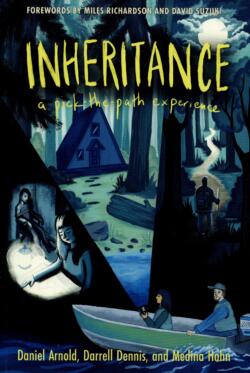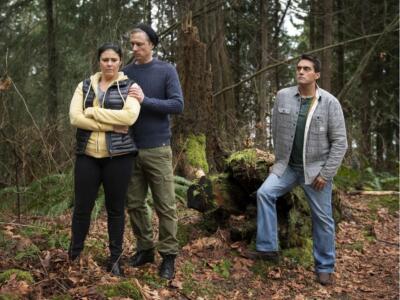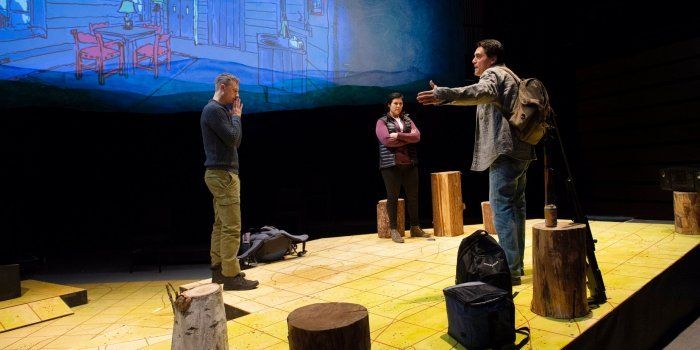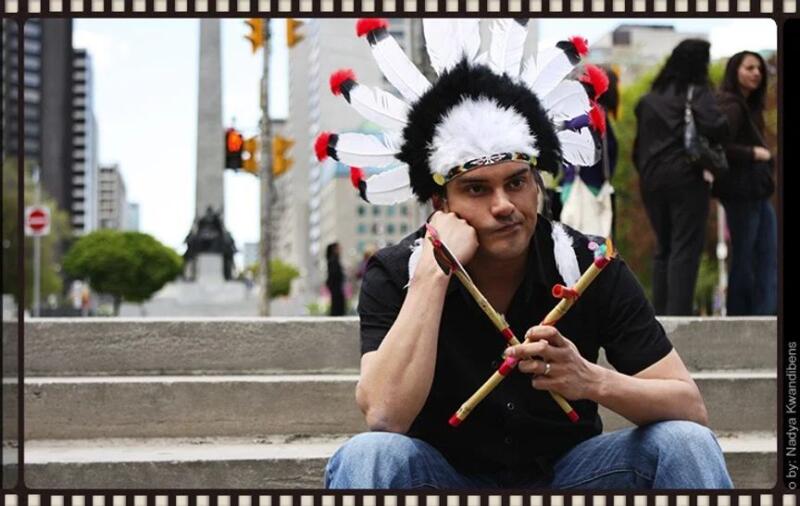1848 Share and share alike
Inheritance: a pick-the-path experience
by Daniel Arnold, Darrell Dennis, and Medina Hahn
Vancouver: Talonbooks, 2022
$24.95 / 9781772013627
Reviewed by Trevor Marc Hughes
*
 There was an opportunity to post this review on National Indigenous Peoples Day, but then, I got to thinking: why do we have to pick just one day to look at the topic embedded in this extraordinary play? Shouldn’t we be having this discussion every day?
There was an opportunity to post this review on National Indigenous Peoples Day, but then, I got to thinking: why do we have to pick just one day to look at the topic embedded in this extraordinary play? Shouldn’t we be having this discussion every day?
Forewords by Kilslaay Kaaji Sding Miles Richardson, O.C. and David Suzuki set the stage. Readers are given the difficult stuff first: that Indigenous Peoples were seen as “not human,” that Indigenous Peoples were perceived as “not competent to have human rights,” and the “colonialist and racist principle of terra nullius” (translated from the Latin this means “land belonging to no one”) is a big lie. But with all of the hard-hitting issues that this draws out, this introduction does bring up the notion that settler Canadians and Indigenous Peoples must share this place, “in a way that enables our mutual coexistence into the future.” David Suzuki writes about the racism his grandparents faced in British Columbia, “resourcism,” and anthropocentrism.

Billed as an interactive theatre experience, Inheritance: a pick-the-path experience early on sets itself up to be like no other play you’ve known. During the play’s performance, audience members are given handheld devices to vote on what they want to happen next. Within the text of the play, readers come to a fork in the road, a “Choice-Point,” where a decision needs to be made, and you make decisions that ultimately bring you to a particular conclusion. The play was first produced in March 2020.
Noah and Abbey are an urban couple travelling to Abbey’s father’s place in the woods. They unexpectedly meet Frank, an Indigenous man who appears to have been staying there for some time. Abbey thinks Frank is squatting and wants him to leave. She offers him money to stay somewhere else. Frank would prefer it if they were all friends and he stayed. There appears to be a bloodstain on the floor. Then we come to Choice-Point 1.2, in the play introduced by the host: A) Should Noah confront Frank about it, privately? (go to Scene 2B, page 26), B) Should Abbey see the bloodstain too? (Go to Scene 2C, page 30), C) Should Frank take their money (go to Scene 2A, page 20). It’s all quite nostalgic, reminding me of the Choose Your Own Adventure book series I read as a kid, and I think that is on purpose. I choose A.

The discussion continues: What is the best use of the land? As theatre the conflict within is provocative, more to the point, it’s thought-provoking. It is these things in the sense that it had me walking around the place, thinking out loud, long after reading passages. In the Annex Theatre, during the run of March 3rd to 15th, 2020, I can only imagine the discussions performances would have provoked. The land on which the play was being performed was unceded territory. Government decisions that took place many years previous initiated settlement, long before the audience was born. But what this play does is introduce the notion that we all play a part in reconciliation, and it is a powerful argument.

I must admit I have some history with Darrell Dennis, as we were both cast members, series regulars, in a television series – Northwood – that aired on the CBC in which we were both cohabitants of a fictional community on Vancouver’s North Shore. The series itself was founded on the British tradition of popular UK television serials, and transplanted here. Perhaps it could have been interpreted as a colonial series. It lasted four seasons.
But since then, I’ve taken note of Dennis’ ability to pair humour and writing on the subject of issues that confront us. He used to call it Native comedy. When I first interviewed him for CBC Radio in 1998, he was working with director Herbie Barnes (who also directed Inheritance) on Toronto at Dreamer’s Rock at the Waterfront Theatre in Vancouver. Dennis has developed his own style of writing for the stage through Tales of an Urban Indian.
Any good story requires conflict, and there is plenty of confrontation in Inheritance, but the Choice-Point concept, having audience members vote before we move on, allows for some thought to take place before the play continues. This may dissipate feelings of anxiety or disappointment, as these are breaks, allowing for the decision to be made as a group, and the pressure to be taken off the individual. One flaw I can see in the play is that this use of this democratic voting system is contradicted by Frank at one point along my chosen story, who denounces democracy as having winners and losers. There are moments of levity though, even romantic connection, times when similarities are found and differences temporarily put to the back burner. But ultimately, Inheritance: a pick-the-path experience, represents a discussion worth having, not as a shouting match, but as a presentation of good and bad, where sharing the land equitably is the topic on offer. And, if I may use a Western comparison here, via Ireland, the play reminded me of the often-challenging satire and social commentary put forth by George Bernard Shaw, who as a playwright, through his work that challenged social convention in the Victorian era, became a household name and encouraged change. Perhaps this kind of theatre has a universality to it, one that crosses cultural and racial boundaries, and shows how the need to share, to make change for the better, need not be feared.

*

Trevor Marc Hughes has written several books and many articles about his motorcycle travels across British Columbia. He edited Riding the Continent, Hamilton Mack Laing’s account of his 1915 ride on a Harley-Davidson 11-F across the continental United States. He’s the author of Capturing the Summit: Hamilton Mack Laing and the Mount Logan Expedition of 1925. He is currently the interim non-fiction editor for The British Columbia Review.
*
The British Columbia Review
Interim Editors, 2023-24: Trevor Marc Hughes (non-fiction), Brett Josef Grubisic (fiction)
Publisher: Richard Mackie
Formerly The Ormsby Review, The British Columbia Review is an on-line book review and journal service for BC writers and readers. The Advisory Board now consists of Jean Barman, Wade Davis, Robin Fisher, Barry Gough, Hugh Johnston, Kathy Mezei, Patricia Roy, Maria Tippett, and Graeme Wynn. Provincial Government Patron (since September 2018): Creative BC. Honorary Patron: Yosef Wosk. Scholarly Patron: SFU Graduate Liberal Studies. The British Columbia Review was founded in 2016 by Richard Mackie and Alan Twigg.
“Only connect.” – E.M. Forster
6 comments on “1848 Share and share alike”